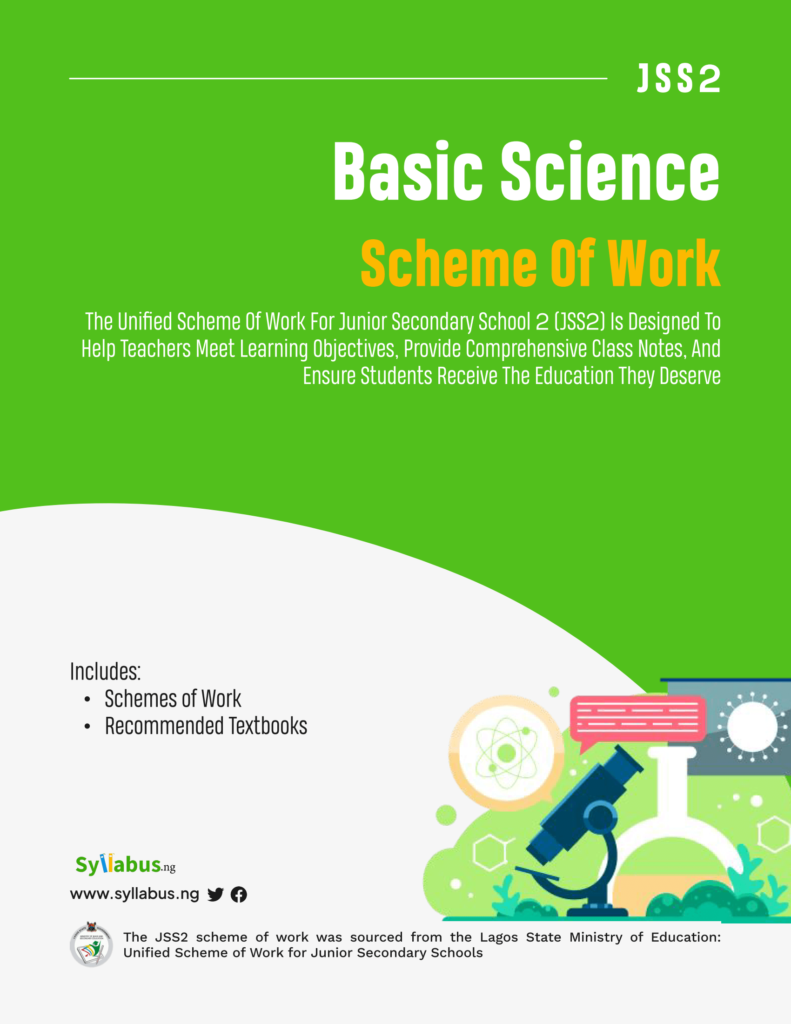JSS2 Basic Science Scheme of Work
Download the Junior Secondary School 2 (JSS2) Unified Scheme of Work for Basic Science to serve as a guide for educators

Home » JSS2 Scheme of Work » JSS2 Basic Science Scheme of Work
Home » JSS2 Scheme of Work » JSS2 Basic Science Scheme of WorkAbout JSS2 Basic Science Scheme of Work
In Junior Secondary Schools (JSS2) in Nigeria, Basic Science aims to equip students with essential scientific knowledge and inquiry abilities. With the adoption of the National Policy on Education, the Basic Science program was introduced as a core subject at the Junior Secondary School level to introduce students to the world of science and to prepare them for higher education in science and technology.
Basic science is a science subject taught at the lower, upper primary, and junior secondary school levels. It helps students gain an understanding of the roles and functions of science in everyday life and the world in which they live.
By studying Basic Science at this level, students are encouraged to grasp scientific concepts, principles, and methodologies through a blend of practical experiments, theoretical learning, and hands-on activities. This foundational grounding in Basic Science is pivotal for students as it sets the stage for further academic pursuits in STEM disciplines and future career paths.
Assessment Guide
In junior secondary schools, how students are assessed in Basic Science can differ from school to school. However, typically, they are evaluated through tests or quizzes (Continuous Assessment Tests) and end-of-term exams.
Grading usually follows a scale from A to F, with A representing excellent performance, typically scoring around 70% or 80%, and F indicating failure, usually below 50% or 45%
Download JSS2 Basic Science Scheme of Work

Know what’s expected of you as an educator
Download the Lagos State Unified Scheme of Work for JSS2 Basic Science
JSS2 First Term Scheme of Work for Basic Science
| LAGOS STATE MINISTRY OF EDUCATION: UNIFIED SCHEMES OF WORK FOR JUNIOR SECONDARY SCHOOL | ||
| Basic Science Scheme of Work for Junior Secondary School 2(JSS2) | ||
| Class | J.S.S 2 | |
| Subject | Basic Science | |
| Term | First Term | |
| Week | Topic | Breakdown |
| 1 | LIVING THINGS – HABITAT | I. Definition of Habitat II. Types of Habitat, e. g. Aquatic, Terrestrial and Arboreal (Water, Land and Air) and Examples. |
| 2 | ADAPTATION OF LIVING THINGS TO THEIR HABITAT | I. Various Adaptive II. Features of Living Things in their Habitat |
| 3 | RELATIONSHIP BETWEEN ORGANISMS IN THE SAME HABITAT | Characteristics of Organisms in the same Habitat and what they have in Common |
| 4 | UNIQUENESS OF HUMAN BEINGS | I. Reasoning II. Problem Solving III. Inquisitiveness IV. Observation V. Measurement VI. Inference |
| 5 | MEASUREMENT OF GROWTH AND DEVELOPMENTAL CHANGES | Growth changes in Height, Weight and Size. |
| 6 | HUMAN DEVELOPMENT I | Developmental Changes: I. Infancy II. Adolescents III. Adulthood IV. Characteristics Features of Stages of Development |
| 7-8 | HUMAN DEVELOPMENTII | I. Classification of Growth and Developmental changes as Temporary/Permanent II. Factors that affect Growth and Development |
| 9 | BODYIMAGE I | I. Meaning of Body Image II. Physical Features, Size, Height, Race, Ethnicity, Color of Skin,Eyes and Hair |
| 10 | BODY IMAGE II | Pubertal and Body Image: I. Effect of Pubertal changes on Body Image and Behavior II. Misconceptions about Beauty as presented in the Media III. Individual Uniqueness |
| 11 | REVISION | |
| 12 | EXAMINATION | |
JSS2 Second Term Scheme of Work for Basic Science
| Term | Second Term | |
| Week | Topic | Breakdown |
| 1 | REVISION OF LAST TERM’S WORK | Work, Energy and Power I. Meaning of Work, Energy and Power II. Concept of Work, Energy and Power III. Forms of Energy – Heat, Light, Kinetic, Potential, etc. |
| 2 | POTENTIAL AND KINETIC ENERGY | I. Meaning of Potential and Kinetic Energy II. Calculate Kinetic and Potential Energy |
| 3 | CALCULATION INVOLVING WORK DONE | |
| 4 | ENERGY TRANSFER WHEN WORK IS DONE | |
| 5 | FAMILY LIFE EDUCATION I | I. Communication Techniques II. Importance of Honest Communication about Pubertal concerns to Responsible Parents |
| 6 | FAMILY LIFE EDUCATION II | I. Life Span Continuum II. Expressions of Feeling Desires and Fantasies from Birth to Death III. Factors that Influence Individual Sense of Self – Worth (BodyImage) |
| 7-8 | KINETIC THEORY | The Assumptions of the Kinetic Theory |
| 9 | EXPLANATION OF SOME PHENOMENA USING KINETIC THEORY | Explain the Molecular Structure of Solids, Liquids and Gases using the Kinetic Theory |
| 10 | BOILING AND EVAPORATION | I. Explanation of Boiling and Evaporationusing Kinetic Theory II. Factors that affect Evaporation |
| 11 | REVISION | |
| 12 | EXAMINATION |
JSS2 Third Term Scheme of Work for Basic Science
| Term | Third Term | |
| Week | Topic | Breakdown |
| 1 | REVISION | |
| 2 | THERMAL ENERGY – I | Heat Flow |
| THERMAL ENERGY – II | Heat Transfer – Conduction, Convection and Radiation | |
| 3 | REPRODUCTIVE HEALTH | I. Genetic Counseling II. Breast Feeding and Its Advantages III. Myths about Breast feeding |
| 4 | ABSTINENCE | I. Meaning of Abstinence II. Types of Abstinence – Life Long, Delayed, Periodic Abstinence III. Skills and Behavior that PromotesAbstinence IV. Reasons why Young People must Abstain from Pre – MaritalSex V. Reasons why Young People engage in Pre – Marital Sex VI. Facts and Myths about SexualAbstinence |
| 5 | CHEMICALS | I. Meaning of Chemicals II. Classes of Chemicals a. Based on Use – Pharmaceutical/Cosmetics, Nuclear, Agrochemicals, Industrial and Laboratory b. Based on Hazardous Nature – Highly Hazardous and Toxic, Moderately Hazardous and Toxic, Non Hazardous and Toxic |
| 6 | CHEMICALS – SAFETY MEASURES | Safety Measures when Using Chemicals I. Adhere to the Manufacturer’s SafetyInstructions II. Follow Safety Guidelines for Chemical Storage and Handling III. Observe and Adhere to SafetySigns and Instructions on ChemicalPackages IV. Ensure Proper Labeling and Storage of Chemicals |
| 7-8 | DRUG ABUSE | I .Meaning of Drug and Drug Abuse II. Methods of Drug Use, e. g.Inhaling, Injection, Smoke, etc. III. Common ways of Misusing Drugs III. Social Risks Factors in Drug Abuse, e. g. BrokenHome, PeerInfluence IV. Desperate move to get MoreDrugs |
| 9 | CRUDE OIL AND PETROCHEMICALS I | I. Meaning of Crude Oil and Petrochemicals II. Refining of Crude Oil |
| 10 | CRUDE OIL AND PETROCHEMICALS II | I. Uses of Crude Oil and Petrochemicals II. Importance of Crude Oil and Petrochemicals |
| 11 | REVISION | |
| 12 | EXAMINATION |
Recommended Basic Science Textbooks for Junior Secondary School 2
The following are recommended Basic science textbooks for J.S.S.2.
- Fundamental Basic Science for JSS2 by Egwudike D.C et.al
- Model Basic Science/Workbook for J.S.S.2 by Okoye E. I – Mid-Field Publishers Ltd
- WABP Basic Science/workbook for J.S.S.2 by Agbebi E.A, Mwoltu P.P Et al – West African Publishers Ltd
- Basic Science for J.S.S.2 by Ndu F.O, Olarewaju, A.O et al – Learn Africa Plc.
- Basic Science/workbook forJ.S.S.2 by Bajah S.T, Ango M.L et al – University Press Plc
All JSS2 Scheme of Work
Download JSS2 Basic Science Scheme of Work

Know what’s expected of you as an educator
Download the Lagos State Unified Scheme of Work for JSS2 Basic Science











